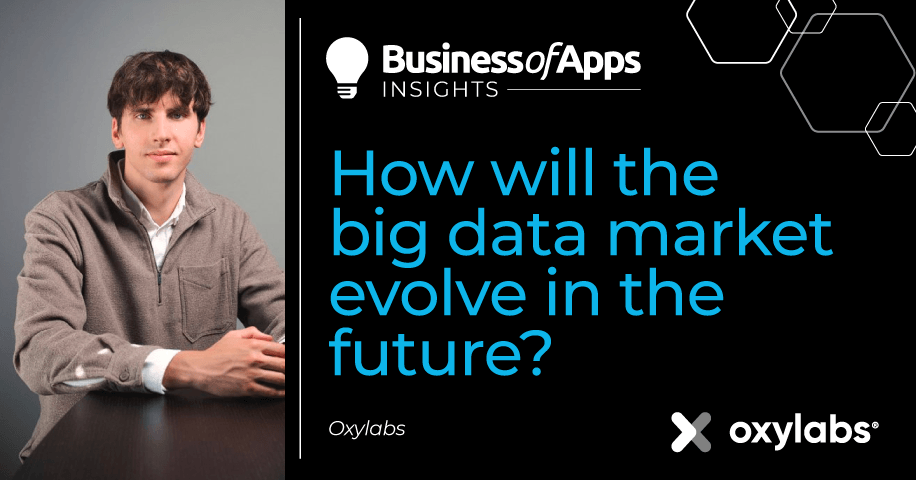Big data has been around for some time now, becoming a more or less common concept in business. However, recent developments in AI technology have shaken up an already volatile field, inviting us to reconsider our projections of how the big data market will look in the future.
We can already see the signs that these developments have game-changing effects on the labor market, business data management, and entire organizational structures. Tracking these signs allows for a better understanding of this fast-paced evolution that we are witnessing.
Rapid developments in big data
Mostly driven by evolving web data gathering technologies, the recent breakthrough years in the big data sector have brought many positive changes. Complex machine-learning models have become more accessible, hardware and software solutions for ML algorithm training are now cheaper and more specialized, while tools for creating and optimizing the models are more readily available due to cloud technology.
Apart from the advancements in ML, two other important trends that significantly influence big data processing capabilities can be distinguished:
- More powerful graphic processing units (GPUs) and enhanced precision with which AI performs tasks allow businesses to make the most of parallel processing. Two or more processing units solving different aspects of the same problem now produce better solutions faster, enlarging the scope of use cases for this method.
- The rapid rise of MLops (machine learning operations) allows more effective ML model deployment, observability, and experimentation in production environments.
Companies of all sizes have come to realize that big data and ML algorithms based on it are going to be among the most growing and growth-inducing factors in business. This year’s incredibly high-valued acquisitions of very young tech companies go to show it. For example, Databricks paid $1.3 billion for just a few years old, 60-employee MosaicML because the latter has offered a novel and convenient method for training AI-based tools.
There is room for more innovation as current big data-based solutions are certainly not perfect. In the near future, we can expect developments in models for generating text and visuals, as well as improved tools for tasks related to communication.
On the other hand, there are legitimate concerns about biased and unethical decisions that AI can come up with when there is no human oversight. These concerns will continue to foster regulatory initiatives such as the European Union’s Artificial Intelligence Act (AIA).
Growing regulation will, most probably, force firms to look for new ways to collect or generate the necessary data. Furthermore, companies will also need to figure out how to properly utilize all of the data they are now collecting instead of letting it collect dust.
Big data across industries–the impact on apps
One of the greatest benefits brought upon by big data is the immense flexibility and customizability. Undoubtedly, big data will affect almost every industry, all the way from e-commerce to SaaS. But the greatest potential lies in the latter, particularly apps.
Most other industries rely on a mix of brick-and-mortar and digital operations while applications are nearly always exclusively digital. Since big data mostly arises out of the digital space, the business of apps is better positioned to take advantage of the large volume of information.
CTV Growth Guide: A must-read for performance marketers
Whether you’re looking to boost brand awareness or drive user acquisition, this guide has you covered. Learn how to leverage CTV for both brand awareness and performance-driven campaigns and get actionable insights to optimize your strategies.
Download nowMany of the required data collection pipelines are already in place for applications. Some may even be already collecting such volumes of data that it may be considered big data. Yet, utilization remains a relative mystery to many companies.
Key big data touchpoints for mobile app companies all revolve around improving the application itself. Every single interaction point in an application can be logged, analyzed, and acted upon. In an ideal sense, big data provides companies with the opportunity to build the “perfect” application.
Yet, such implementations of big data only touch upon the first layer of the industry. First and second-party data will only get you so far. With third-party data, either acquired from Data-as-a-Service or through implementations of web scraping, companies can begin adapting to the market as a whole.
In other words, it is one thing to inch closer to perfection when developing an app for your existing users. It’s an entirely different thing to inch closer to perfection for the market as a whole. And that’s where third-party-generated big data can come into play.
Big data, which includes third-party sources, can be used to predict market trends, consumer needs, and many other aspects of the entire industry. An entirely new world of business insights can become available through big data.
Finally, app companies are uniquely positioned for testing data-driven hypotheses. They can easily modify features of their services or design, and run A/B tests with a quick turnaround time. E-commerce businesses, for example, have a harder time testing hypotheses as these will often involve physical inventory.
Therefore, while big data is positioned to change all industries, the SaaS and application sectors have the most potential to extract value out of big data. But that takes a large number of specialists with rare skills.
Employers’ perspective–the growing need for data specialists
As an increasing number of firms are getting interested in applying big data solutions, the demand for various kinds of data specialists is bound to continue growing. Along with the aforementioned compliance officers, big data experts capable of creating tools based on it are on top of the “most wanted” list.
Data engineering is at the center of professions in the big data sector. Data engineers are the ones responsible for obtaining data and its initial processing, enabling the creation of new models. Meanwhile, among emerging professions, the demand for MLops (machine learning operations) engineers is also growing fast. Without MLops engineers, companies usually cannot deploy or supervise machine learning models created by data scientists.
The demand for data specialists is being boosted even more by new AI-based tools, like ChatGPT, that attract huge public interest and media coverage. Up to a point, such tools might save a company’s time and increase productivity. Additionally, these tools foster interest in big data and the inception of new professions. For example, the position of prompt engineer, currently boasting potentially 6-figure salaries, has not even been heard of just a few years ago.
Data democratization is another trend affecting the labor market. Companies aim to remove data silos, enabling more business users to work with data directly in the course of carrying out their main tasks. This goes along with shifting some data analysis responsibilities from data teams to product, marketing, or other departments. Thus, it can be expected that the need for specialists who are skilled in both data analytics and one of the domains of business will grow in the future.
Employees’ perspective–getting the skills in demand
From the perspective of job seekers, the aforementioned developments mean two things.
- The big data sector provides an increasing number of lucrative career opportunities.
- Having skills in data analytics is a major advantage for specialists across the departments.
Naturally, this raises the interest in getting data-related skills among those thinking about their future career path. In terms of higher education, aside from study programs that explicitly have “data” or “AI” in their titles, future students can choose general subjects like mathematics and statistics to acquire a robust analytical background. Knowing specific programming languages, such as Python, would be beneficial, too, as data scientists and engineers today often need to automate processes (for example, data collection at scale).
Interestingly, getting the skills relevant to the big data market does not necessarily require going for the hard sciences. Social sciences, like psychology, are filled with courses on higher mathematics and statistical modeling while also training experts to interpret real-life social events and human actions.
Even humanities have perfect conditions to shine in today’s big data labor market. Background in linguistics and philology can be an advantage for prompt engineers and other specialists working with natural language processing tools. Meanwhile, philosophy has AI ethics as its subdiscipline and provides the fundamentals of the interdisciplinary theory of decision-making.
There are also plenty of opportunities outside formal education to learn data-related skills, suitable for both labor market beginners and seasoned workers looking to gain additional qualifications. Various online courses allow learning on your own time, making it easy to accommodate it with a day job or other responsibilities. Such accredited private institutions like Turing College remotely prepare data specialists specifically to have skills and practical knowledge currently in demand.
Willingness to learn constantly is perhaps the most important attribute when aiming for a career in the big data sector. It all begins with learning the fundamentals of statistics, databases, and programming languages like SQL and Python for data processing. When core knowledge is in place, it is important to keep track of technical innovations, new tools, models, and firms in the big data industry. Platforms like Substack provide access to numerous blogs and newsletters that allow one to conveniently stay on top of such news.
Finally, one should have an active interest in the principles of business and how it functions in order to solve its problems with the help of big data. After all, the main goal of data processing and analysis is finding new and better ways to do business.
In conclusion
Being able to work with big data and AI provides a continually growing advantage for both companies and employees. However, the big data market is so dynamic and fast-evolving that all future predictions should come with a disclaimer. Unforeseen innovations and developments can quickly give birth to new professions while making others obsolete. The key to feeling secure in such volatile conditions is effective learning–both companies and employees should be prepared to process and impart new knowledge as it is being created–nearly in real-time.











